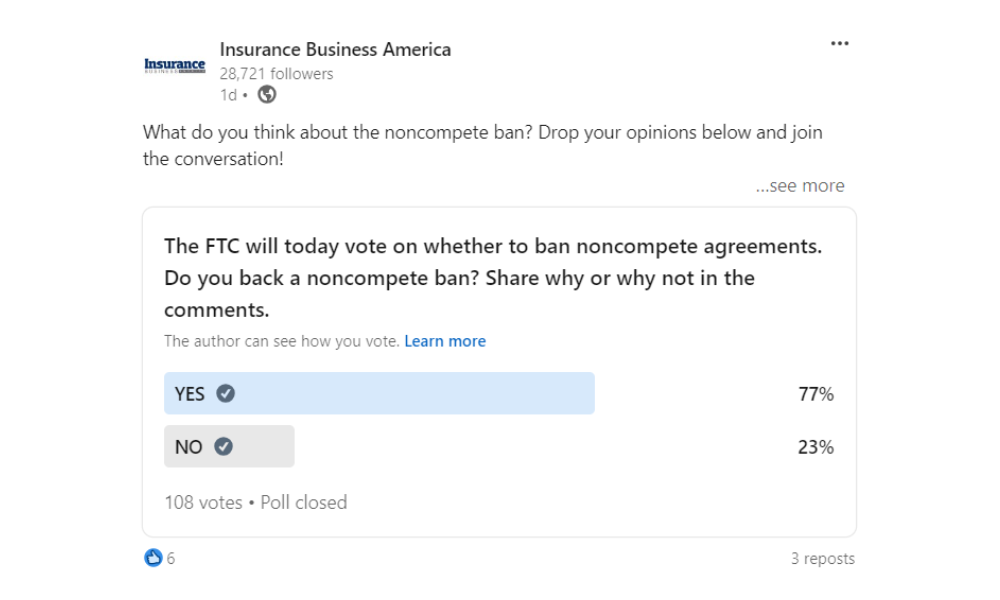And the right way to safeguard your non-solicitation contract clauses

It didn’t take lengthy for the U.S. Chamber of Commerce to attempt to block a sweeping regulation that prohibits the usage of employment clauses that forestall employees from leaving and taking jobs with competing companies.
The big enterprise commerce affiliation filed a lawsuit on Wednesday – the day after the Federal Commerce Fee accepted a last rule that might eradicate the usage of non-compete agreements for nearly each U.S. worker.
However insurers and insurance coverage brokerages shouldn’t be lulled to sleep by the Chamber’s and different authorized challenges which are sure to emerge, mentioned Matt Prewitt (pictured above, left), a associate at ArentFox Schiff. They should begin making ready for the profound modifications in enterprise practices that the rule will usher in.
“They could take their eye off the ball and assume ‘drawback solved’” by the authorized motion to scuttle the regulation, Prewitt mentioned. “That’s in all probability the worst factor they will do on this local weather.”
Prewitt factors to the break up FTC vote, 3-2, on the 570-page last rule. The three Democratic commissioners have been in favor, saying it’s wanted to guard employees and promote competitors. The Republican commissioners asserted the FTC exceeded its authority in issuing the rule.
However there was no reward for non-competes on the FTC open assembly on Tuesday.
“No person gave a full-throated, aggressive protection of non-compete agreements,” Prewitt mentioned. “Employers want to acknowledge the FTC’s motion, regardless that it might exceed constitutional authority, is a part of a broader pattern in opposition to the enforcement of non-compete agreements.”
FTC touts freedom to pursue a brand new job
The FTC mentioned roughly 30 million U.S. employees are topic to non-compete agreements. The ultimate rule would:
- Make unenforceable current non-competes for many staff.
- Ban non-competes for senior executives, or these making greater than about $151,000, after the efficient date of the rule, which is 120 days from when it’s revealed within the Federal Register.
- Enable current non-competes for senior executives to stay in impact.
The FTC mentioned non-compete reform would end in an annual $524 improve in earnings for the typical employee and spur the creation of 8,500 new companies annually.
“The FTC’s last rule to ban non-competes will guarantee Individuals have the liberty to pursue a brand new job, begin a brand new enterprise or convey a brand new thought to market,” FTC Chair Lina Khan (pictured above, heart) mentioned in a press release.
Companies have turned to non-compete clauses in employment contracts as a solution to shield commerce secrets and techniques and different proprietary data. The FTC rule will shut off that choice.
“There’s extra skepticism about non-compete agreements,” mentioned Kevin Paule (pictured above, proper), an lawyer with Hill Ward Henderson. “Within the long-term, companies ought to take into consideration whether or not there are different methods they will shield their property.”
Rule doesn’t ban, however might have an effect on non-solicitation clauses
The FTC advised that the purpose of defending proprietary enterprise data might be met by means of trade-secret legal guidelines and non-disclosure agreements.
The FTC rule doesn’t ban non-solicitation agreements, the place staff are free to work at a competing agency however restricted in taking prospects or shoppers with them.

“The factor that I actually need to guard is the guide of enterprise, and the non-solicit is much more essential” than a non-compete, mentioned Wealthy Eknoian (pictured instantly above), CEO of World Insurance coverage Associates. “When you instructed me that individuals might depart after which begin taking their shoppers, then I might say, properly, that is an actual worth killer. However folks with the ability to depart and work elsewhere, truthfully, that does not sound horrible to me.”
Though the FTC rule doesn’t ban non-solicitation agreements, Eknoian and others should must evaluation the scope of their non-solicits. The FTC rule says that employment agreements which are so broad that they successfully turn out to be non-competes are prohibited.
Influencing staff actions
Whether or not a non-solicit is a de facto non-compete relies on its parameters, Prewitt mentioned.
“You’ve obtained to verify once you’re drafting your non-solicit covenant…that there’s a transparent path for an worker to know what’s the proper solution to exit,” Prewitt mentioned.
The truth that the FTC rule doesn’t explicitly handle non-solicits might impact groups of brokers leaving one agency for an additional.
“An employer might proceed to forestall a former worker from soliciting or ‘poaching’ former staff,” Paule mentioned. “Staff and groups shall be allowed to maneuver, however there could also be litigation concerning the idea for the motion and whether or not improper solicitation occurred.”
Permitting non-competes in enterprise gross sales
In one of many largest modifications the FTC made to the ultimate rule, it would permit non-competes for use within the context of the sale of a enterprise. The unique proposal in January 2023 mentioned {that a} vendor needed to personal at the least 25% of a enterprise to be topic to a non-compete. The ultimate rule removes that threshold.

“The truth that they took that out is definitely optimistic for gross sales transactions,” mentioned Jim Witz (pictured instantly above), a shareholder at Littler Mendelson. “It could have made gross sales tougher if firms weren’t capable of shield their funding within the firm they’re buying by means of a non-compete.”
That was a vibrant spot within the last rule for companies. However Witz additionally cautions that they will’t depend on the entire thing being eradicated regardless that authorized challenges have created a lot uncertainty across the regulation.
“Employers have to organize as if the rule goes to outlive – at the least pending a doable injunction staying enforcement,” Witz mentioned.
Potential ‘game-changer’ requires new technique
The FTC rule is “probably game-changing” for companies as a result of they’ve relied on non-competes for many years to guard their propriety data, Prewitt mentioned. Now they need to consider methods to make staff need to keep, comparable to compensation incentives.
“They want a broader technique past non-compete agreements,” Prewitt mentioned. “That technique wants to incorporate commerce secret safety insurance policies, confidentiality agreements and employee-retention [practices] which are extra carrot and fewer stick.”
Eknoian mentioned he’s prepared for a world with out non-competes.
“I like the established order, we’re doing very well, but when change comes about, you solely have one selection, and that is to determine it out and be higher within the new setting than anybody else,’ he mentioned. “We’re gonna roll up our sleeves and determine it out.”

Jen Frost contributed to this story.
Associated Tales
Sustain with the newest information and occasions
Be a part of our mailing checklist, it’s free!
